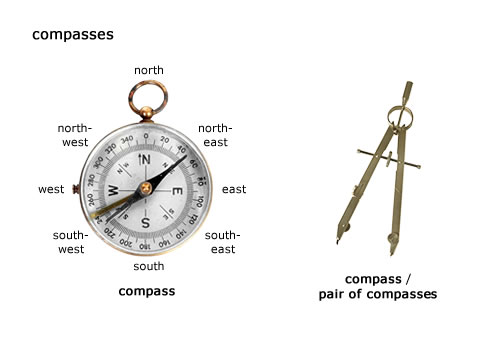 compass
compass

com·pass [compass compasses compassed compassing] BrE [ˈkʌmpəs] NAmE [ˈkʌmpəs] noun 
1. (also magˌnetic ˈcompass)countable an instrument for finding direction, with a needle that always points to the north
•a map and compass
•the points of the compass (= N, S, E, W, etc.)
2. countable (also compassesplural)an instrument with two long thin parts joined together at the top, used for drawing circles and measuring distances on a map
•a pair of compasses
3. singular (formal)a range or an extent, especially of what can be achieved in a particular situation
•the compass of a singer's voice (= the range from the lowest to the highest note that he or she can sing)
See also: ↑magnetic compass
Word Origin:
Middle English: from Old French compas (noun), compasser (verb), based on Latin com- ‘together’ + passus ‘a step or pace’. Several senses (‘measure’, ‘artifice’, ‘circumscribed area’, and ‘pair of compasses’) which appeared in Middle English are also found in Old French, but their development and origin are uncertain. The transference of sense to the magnetic compass occurred in the related Italian word compasso, from the circular shape of the compass box.
Example Bank:
•A compass shows you which direction is north.
•People arrived from all points of the compass.
•The railway fanned out from Moscow to all points of the compass.
|
|
